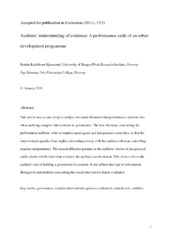| dc.contributor.author | Reichborn-Kjennerud, Kristin | eng |
| dc.contributor.author | Johnsen, Åge | eng |
| dc.date.accessioned | 2013-04-23T10:09:30Z | |
| dc.date.available | 2013-04-23T10:09:30Z | |
| dc.date.issued | 2011 | eng |
| dc.Published | Evaluation 17(3): 217-231 | eng |
| dc.identifier.issn | 1356-3890 | |
| dc.identifier.uri | https://hdl.handle.net/1956/6535 | |
| dc.description.abstract | This article uses a case study to analyse two main dilemmas that performance auditors face when auditing complex interventions in governance. The first dilemma, concerning the performance auditors’ roles as improvement agents and independent controllers, is that the improvement agenda often implies interacting closely with the auditees whereas controlling requires independence. The second dilemma pertains to the auditors’ choice of pre-planned audit criteria which limit what evidence the auditors can document. This choice affects the auditors’ role of holding a government to account. It also affects the type of information divulged to stakeholders concerning the social intervention that is evaluated. | en_US |
| dc.language.iso | eng | eng |
| dc.publisher | SAGE Publications | eng |
| dc.title | Auditors' understanding of evidence: A performance audit of an urban development programme | eng |
| dc.type | Peer reviewed | en_US |
| dc.type | Journal article | en_US |
| dc.description.version | acceptedVersion | |
| dc.rights.holder | Copyright the authors 2011 | en_US |
| dc.identifier.doi | https://doi.org/10.1177/1356389011410523 | |
| dc.identifier.cristin | 804316 | |
| dc.source.journal | Evaluation | |
| dc.source.40 | 17 | |
| dc.source.14 | 3 | |
| dc.source.pagenumber | 217-231 | |
| dc.subject.nsi | VDP::Samfunnsvitenskap: 200::Statsvitenskap og organisasjonsteori: 240::Offentlig og privat administrasjon: 242 | nob |
